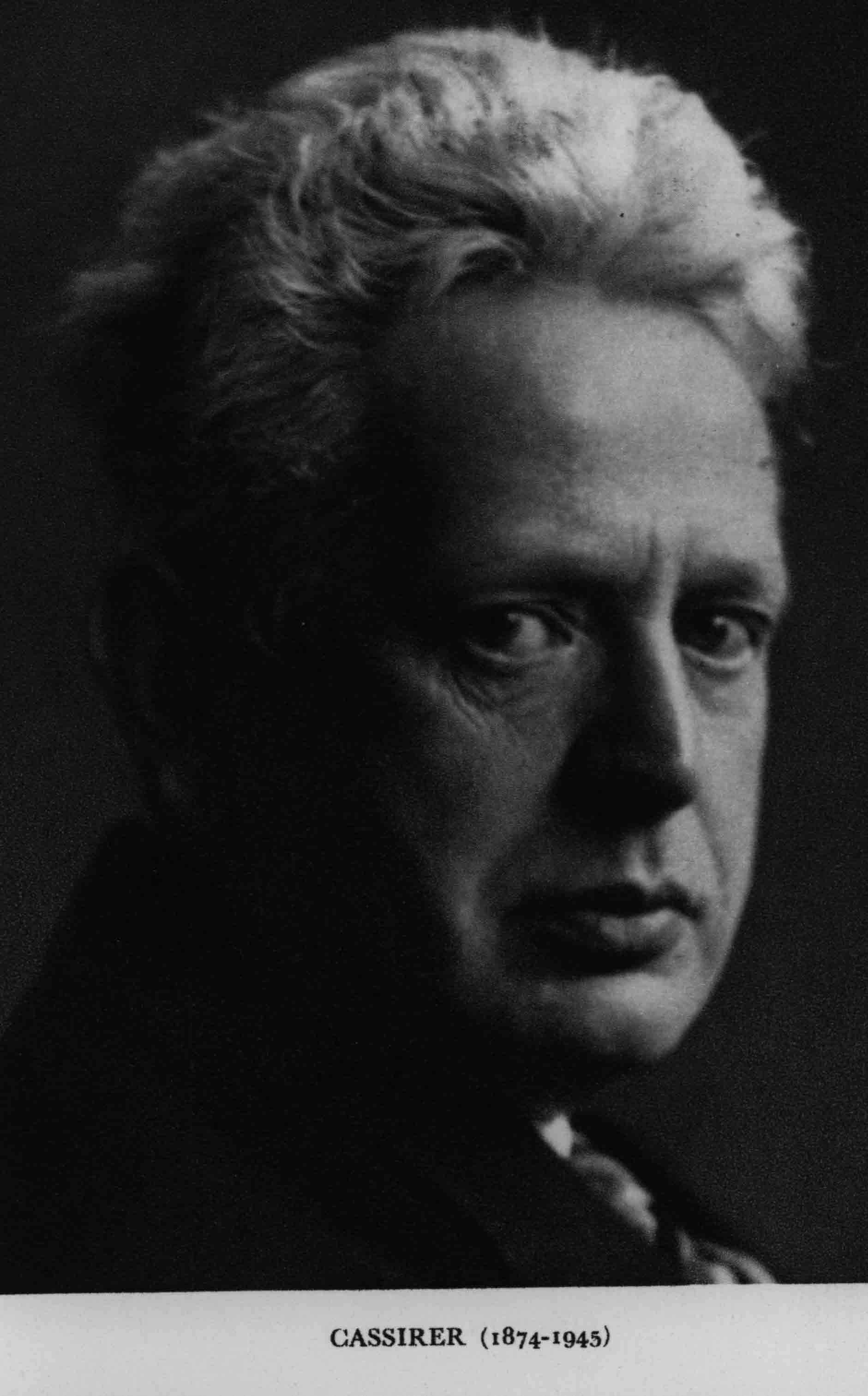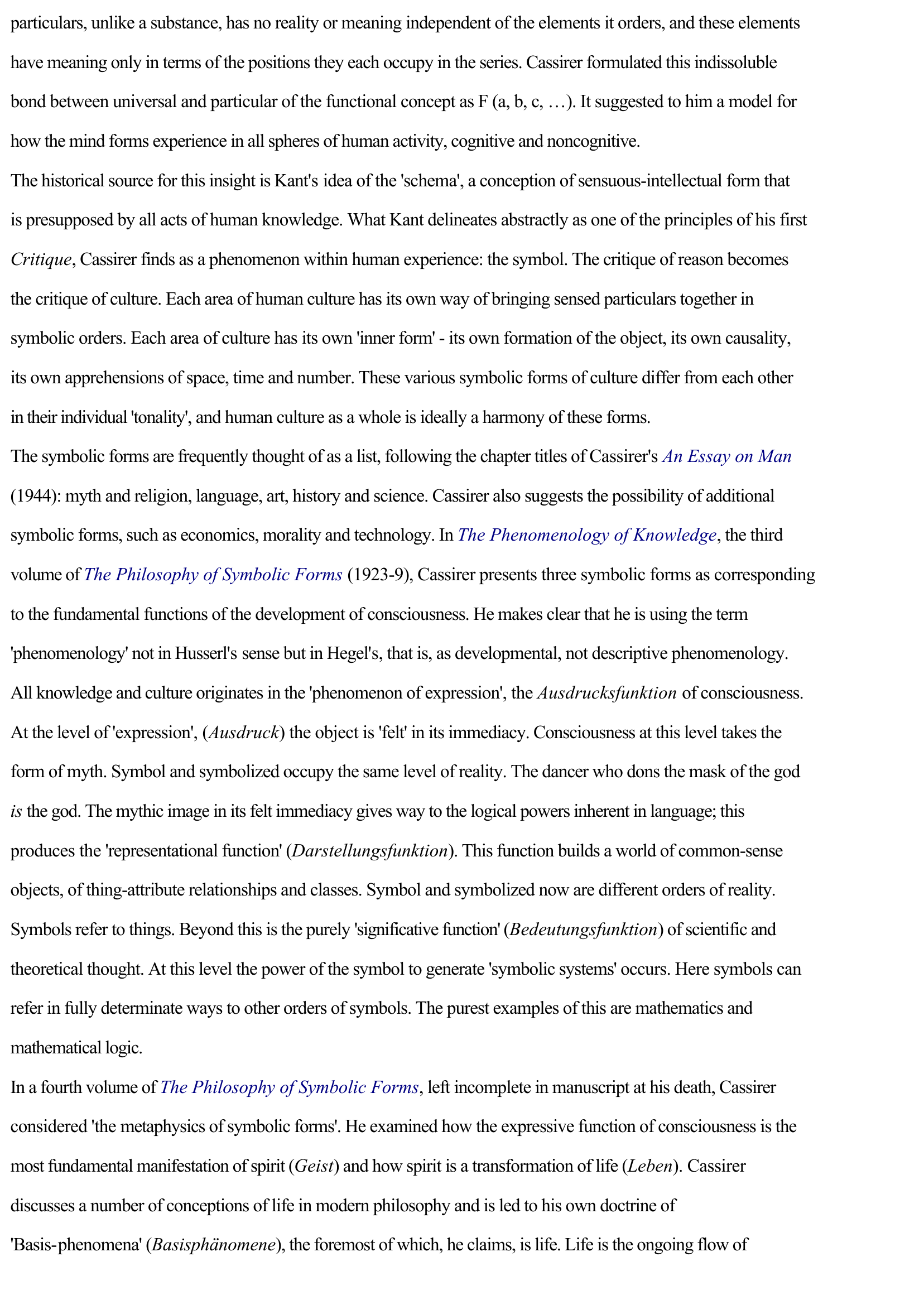Cassirer, Ernst
Publié le 22/02/2012

Extrait du document


«
particulars, unlike a substance, has no reality or meaning independent of the elements it orders, and these elements
have meaning only in terms of the positions they each occupy in the series.
Cassirer formulated this indissoluble
bond between universal and particular of the functional concept as F (a, b, c, …).
It suggested to him a model for
how the mind forms experience in all spheres of human activity, cognitive and noncognitive.
The historical source for this insight is Kant 's idea of the 'schema' , a conception of sensuous-intellectual form that
is presupposed by all acts of human knowledge.
What Kant delineates abstractly as one of the principles of his first
Critique , Cassirer finds as a phenomenon within human experience: the symbol.
The critique of reason becomes
the critique of culture.
Each area of human culture has its own way of bringing sensed particulars together in
symbolic orders.
Each area of culture has its own 'inner form' - its own formation of the object, its own causality,
its own apprehensions of space, time and number.
These various symbolic forms of culture differ from each other
in their individual 'tonality' , and human culture as a whole is ideally a harmony of these forms.
The symbolic forms are frequently thought of as a list, following the chapter titles of Cassirer's An Essay on Man
(1944): myth and religion, language, art, history and science.
Cassirer also suggests the possibility of additional
symbolic forms, such as economics, morality and technology.
In The Phenomenology of Knowledge , the third
volume of The Philosophy of Symbolic Forms (1923-9), Cassirer presents three symbolic forms as corresponding
to the fundamental functions of the development of consciousness.
He makes clear that he is using the term
'phenomenology' not in Husserl 's sense but in Hegel 's, that is, as developmental, not descriptive phenomenology.
All knowledge and culture originates in the 'phenomenon of expression' , the Ausdrucksfunktion of consciousness.
At the level of 'expression' , (Ausdruck ) the object is 'felt' in its immediacy.
Consciousness at this level takes the
form of myth.
Symbol and symbolized occupy the same level of reality.
The dancer who dons the mask of the god
is the god.
The mythic image in its felt immediacy gives way to the logical powers inherent in language; this
produces the 'representational function' (Darstellungsfunktion ).
This function builds a world of common-sense
objects, of thing-attribute relationships and classes.
Symbol and symbolized now are different orders of reality.
Symbols refer to things.
Beyond this is the purely 'significative function' (Bedeutungsfunktion ) of scientific and
theoretical thought.
At this level the power of the symbol to generate 'symbolic systems' occurs.
Here symbols can
refer in fully determinate ways to other orders of symbols.
The purest examples of this are mathematics and
mathematical logic.
In a fourth volume of The Philosophy of Symbolic Forms , left incomplete in manuscript at his death, Cassirer
considered 'the metaphysics of symbolic forms' .
He examined how the expressive function of consciousness is the
most fundamental manifestation of spirit ( Geist ) and how spirit is a transformation of life ( Leben ).
Cassirer
discusses a number of conceptions of life in modern philosophy and is led to his own doctrine of
'Basis -phenomena' (Basisphänomene ), the foremost of which, he claims, is life.
Life is the ongoing flow of.
»
↓↓↓ APERÇU DU DOCUMENT ↓↓↓
Liens utiles
- PHILOSOPHIE DES FORMES SYMBOLIQUES (LA), Ernst Cassirer - résumé de l'oeuvre
- PROBLÈME DE LA CONNAISSANCE (Le). Ernst Cassirer (résumé et analyse de l’oeuvre)
- Le langage et la construction du monde des objets par Ernst CASSIRER.
- Cassirer, Ernst - philosophie.
- Qui était CASSIRER (Ernst) ?

































